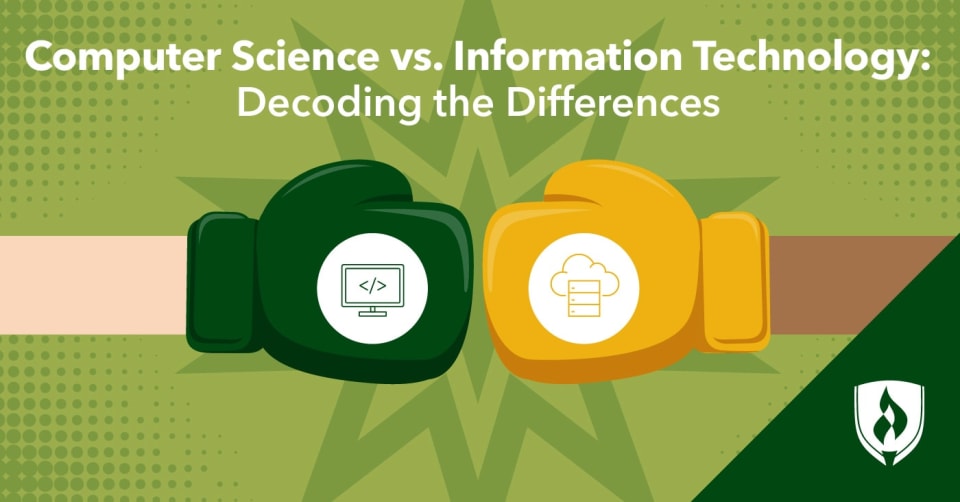Computer Science vs. Information Technology: Decoding the Differences
By Callie Malvik on 11/09/2020

You’ve got a passion for computers and the exciting, world-changing possibilities they offer. Even better? Technology professionals are needed in nearly every industry these days. Today’s digital economy requires a variety of tech pros to support the computers and technology that power businesses off all kinds.
You know you want to work in this impactful field, but now you’re trying to narrow down your career goals and educational focus. If you’ve done any research thus far, you’re probably down to comparing the two most common tracks: computer science versus information technology.
We created this handy guide to help you get a better understanding of the difference between computer science and information technology. Join us as we compare these two thriving fields in some key areas that may affect your decision.
Computer science vs. information technology: The basics
Before we get too far, it’s important to have a solid understanding of the basic differences between computer science and information technology. The biggest distinction really comes down to how these fields use computers. Computer Science degree holders typically work in jobs that focus more on programming and software development. This type of work involves a fair amount of math, theory and coding.
Information Technology degree holders tend to work in roles where they’re responsible for the design, configuration and maintenance of network hardware and servers. By nature, this is much more of a hands-on field—though it’s not all hardware configuration.
Computer science vs. information technology: Job outlook
When choosing an educational path, it makes a lot of sense to look into the prospects of the jobs you’ll be pursuing. Let’s take a closer look at the growth projections for some of the top job titles associated with computer science and information technology, according to the U.S. Department of Labor (DOL).
Projected computer science job growth (2018-2028):1
- Software developer: 7–10 percent (faster than average)
- Computer systems analyst: 7–10 percent (faster than average)
- Application developer: 11 percent or higher (much faster than average)
- Web developer: 11 percent or higher (much faster than average)
Projected IT job growth (2018-2028):1
- Computer support specialist: 11 percent or higher (much faster than average)
- Information systems administrator: 4–6 percent (as fast as average)
- Network architect: 4–6 percent (as fast as average)
- Database administrator: 7–10 percent (faster than average)
Compared to the national average for all occupations, which sits at 4 percent, you can see the future is bright for job seekers entering both the computer science and information technology fields.1 With this in mind, you can focus more on the other job details to make your decision.
Computer science vs. information technology: Skills needed
If you’ve got plans to work in these fields, you’re going to need more than the typical communication, problem-solving and teamwork skills required in nearly any job. So what skills are employers looking for in tech professionals?
To help answer that, we used real-time job analysis software to examine more than a million technology job postings from the past year. The data helped us identify the top skills employers are seeking from candidates pursuing computer science and information technology positions.
Computer science skills in demand:2
- SQL
- Software development
- Java®
- Python®
- Software engineering
- Information systems
- Project management
- JavaScript®
- Linux
- Oracle®
Information technology skills in demand:3
- SQL
- Project management
- Information systems
- Customer service
- Information security
- Technical support
- Java®
- Linux
- Budgeting
- Scheduling
There is a bit of crossover in the two tables above, which isn’t all that surprising considering the similar nature of these fields. But you’ll notice computer science-related jobs place a large emphasis on coding and programming skills like Java® and Python®. Information technology jobs may require some scripting and programming knowledge, but there’s a much stronger emphasis on hardware and business processes.
Computer science vs. information technology: Which is for you?
So when it comes to computer science versus information technology, which path should you pursue? The truth is there’s no real way to provide a definitive answer for everyone. Both computer science and information technology have appealing features regarding job opportunities and earning potential. It all comes down to personal skills and interests.
Do you enjoy the logic and problem solving of writing code? Or would you prefer to roll up your sleeves and work on troubleshooting network hardware?
Regardless of which path you decide to follow, there’s a role for you in supporting today’s ever-evolving digital economy. Learn more about the opportunities available in each of these in-demand fields:
- What Can You Do with a Computer Science Degree?
- What Can You Do with an Information Technology Management Degree?
1Bureau of Labor Statistics, U.S. Department of Labor, Occupational Employment Statistics, [information accessed September 2020] www.bls.gov/oes/.
2Burning-Glass.com (analysis of 1,215,410 computer science-related job postings, Sept. 01, 2019 – Aug. 31, 2020).
3Burning-Glass.com (analysis of 167,175 information technology-related job postings, Sept. 01, 2019 – Aug. 31, 2020).
Python is a registered trademark of The Python Software Foundation.
Java and JavaScript are registered trademarks of Oracle, Inc.
EDITOR'S NOTE: This article was originally published in 2013. It has since been updated to include information relevant to 2020.




